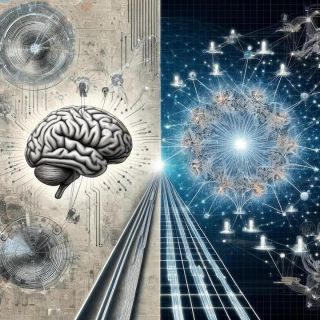Cognition
"Thinking at a Distance" in the Age of AI
LLMs, with their vast corpora and speed, redefine the essence of cognition.
Posted June 1, 2024 Reviewed by Hara Estroff Marano
Key points
- LLMs enable "thinking at a distance"—almost instant access to vast knowledge, pushing human cognitive limits.
- Human-AI convergence creates "entangled cognition" but risks misalignment between human and AI intellects.
- "Thinking at a distance" surfaces deep questions about human-machine cognitive integration.

The extraordinary rise of large language models (LLMs) has exposed a curious split between human and artificial intelligence when it comes to processing information. The dichotomy maybe aptly captured by the metaphor "thinking at a distance," which draws parallels to the idea of quantum entanglement. Hold on to your quarks and let's take a deeper look.
The Sequential Human Mind
For biological intelligences, gathering and synthesizing knowledge has always been an inherently serialized endeavor. Our cognition processes are often bound by linear pathways of information acquisition, limited working memory, and methodical sense-making. We must painstakingly seek out new insights one piece at a time through reading, education, and lived experiences over extended periods. Data is splintered across disparate domains that we gradually unify through concerted cognitive labor over years. These fundamental constraints have gated the tempo of human intellectual progress.
The Parallel AI Perspective
In contrast, LLMs exhibit a near-instantaneous mastery over their entire training corpus. Through massive parallelization and advanced statistical techniques, they can rapidly discern higher-order patterns and establish intricate associations spanning their vast data sets in parallel. For these artificial intellects, "thinking at a distance" enables functional ubiquity—all encoded knowledge is concurrently accessible with low latency—often perceived by users as functionally instantaneous. Traditional bottlenecks around scarce information and computational limitations, in many instances, dissolve.
A Radical Cognitive Shift
This disruptive divergence in how intelligences interface with knowledge catalyzes fascinating philosophical implications. The "thinking at a distance" metaphor evokes concepts like non-locality and quantum entanglement—holistic properties that defy classical models. Could LLMs be harbingers of a new paradigm of computation and cognition no longer constrained by the linear, piecemeal limitations that shaped our evolution? What deeper principles about the elemental nature of intelligence might such decoupled architectures expose?
Human-AI Cognitive Intermingling
As LLMs become increasingly intertwined with human decision-making, the ramifications of "thinking at a distance" grow more interesting and, perhaps, even more acute. We find ourselves in an unprecedented cognitive symbiosis with artificial intellects having instantaneous access to immense informational vaults. The "distance" between our limited biological capacities and insights from unfathomable data reserves rapidly dissolves.
Yet this convergence creates novel challenges around trust, transparency, and knowledge transference. How seamlessly can LLM outputs tutored on narrow data sets map onto the nuanced contexts and open-endedness of the real world? What degrees of transparency into their reasoning are needed to confer appropriate confidence? Intimately bridging the "distance" between human and machine cognition surfaces misalignment risks.
The Next Cognitive Frontier
Despite the hurdles, productively harnessing "thinking at a distance" through human-AI cooperation could spark a renaissance in knowledge work. For the first time, we may circumvent inherent limitations around information access and processing bandwidth that constrained our intellectual development for millennia. Of course, the well-established paths of learning aren't circumvented but optimized.
As this synergistic synthesis deepens, continuously re-examining the "thinking at a distance" framing offers an interesting conceptual lens. It provides insights into foundational questions about intelligence, cognition, and the nature of knowledge itself.
The era of "thinking at a distance" being redefined through human-machine co-evolution is firmly at hand and one of many fascinating aspects of our new Cognitive Age.


